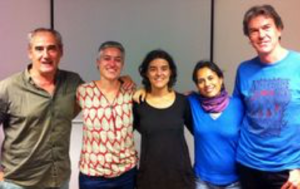
Processes of rural training and territorial dispute to build food sovereignty: Analysis of the experiences promoted by La Vía Campesina organisations in Brazil and the Basque Country.
On October 18th, 2018, Beatriz Casado Baides defended her doctoral thesis, enrolled in our Doctoral Programme in Development Studies. The thesis is titled Procesos de formación campesinos y disputa territorial para construir soberanía alimentaria: Análisis de experiencias impulsadas por organizaciones de La Vía Campesina en Brasil y País Vasco (Processes of rural training and territorial dispute to build food sovereignty: Analysis of the experiences promoted by organisations of La Vía Campesina in Brazil and the Basque Country) and has been supervised by Zesar Martínez.
The theme of this research work is the training processes promoted by organisations within La Vía Campesina (LVC), analysing their training models and their pedagogical and political proposals.
This research argues that in order to understand the building of hegemony and counterhegemony in the agroalimentary system, it is necessary to know how these logics operate on a material and immaterial level, piercing different areas of life. More specifically, the focus of this study is epistemological, pedagogical and academic. The field of knowledges, the production of knowledge and the educational/formative has been identified by the organisations of LVC as an immaterial territory for dispute, a strategic and imperative field of struggle, to face the control and the appropriation of rural knowledge by corporate power, as well as the imposition of the agroindustrial perspective in centres of training, research and construction of knowledge. This dispute is conducted in various ways. In this research it is analysed through own education experiences (non official courses and autonomous rural schools), but also through the experiences developed in collaboration with official education institutions (official courses from different formative levels, including graduate and postgraduate courses). Their formative models and their pedagogical and political proposals confront the hegemonic conceptions and practices of education, knowledge, pedagogy, school, university, research and the agroalimentary system. Therefore, the dispute for educational territories is analysed and framed within a broader territorial dispute (material and immaterial) between different projects for the rural world, that represent development and life models that are antagonistic.
This research claims that the organisations of LVC-South America, especially the organisations of the Latin American Coordination of Rural Organisations (CLOC-Vía Campesina), through their training experiences, have built formative models and counterhegemonic pedagogies of a popular and rural nature, and they have been disputing educational territories and confronting the academic and epistemological hegemonic model for decades. More specifically, the thesis deepens into the theory of the educational experience of the Landless Workers’ Movement (MST) from Brazil, and it analyses the experience of the National School Florestan Fernandes (ENFF), through a double methodological approximation, the ethnographic method and the systematisation of experiences. This MST school has inspired other educational experiences within and beyond the LVC, both on a pedagogical and methodological level. This study describes and analyses how the pedagogical methodology of the ENFF is brought to practice both in its own courses as well as in official courses developed in collaboration with public universities. In addition, the empirical contribution of this work includes the description and analysis of the process of design and launch of the pedagogical proposal of the course Baserritik Mundura, as well as the identification of learnings through the systemisation of its first edition. A pilot experience within the Basque university field, jointly organised by the agrarian trade union EHNE-Bizkaia (member of the LVC) and Hegoa Institute (University of the Basque Country, UPV/EHU), whose pedagogical proposal and formative model is inspired and, in turn, adapts to the Basque reality, the educational experience of the ENFF/MST.
Similar theses


Details
-
Date2018 October 18
-
GradeDistinction Cum Laude
Thesis supervisor

